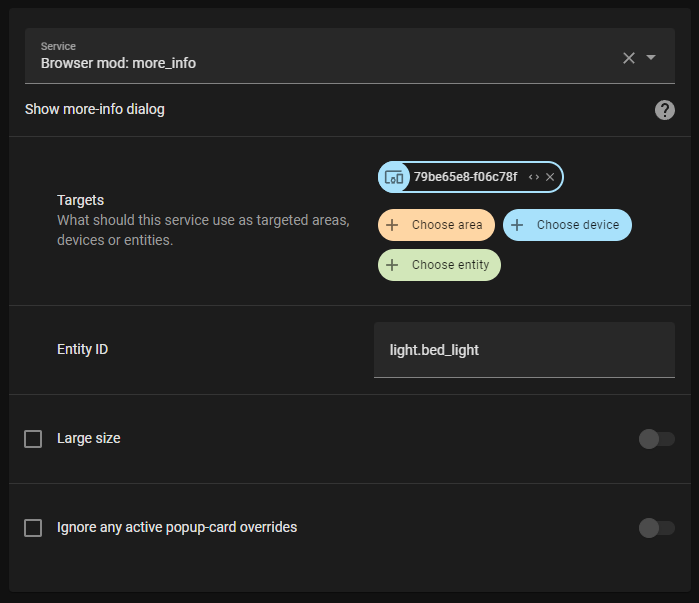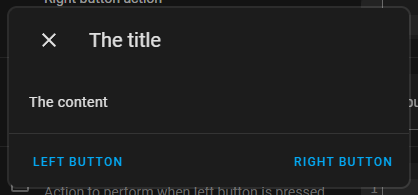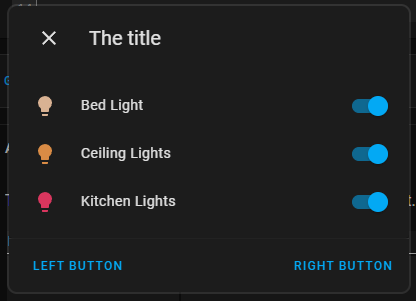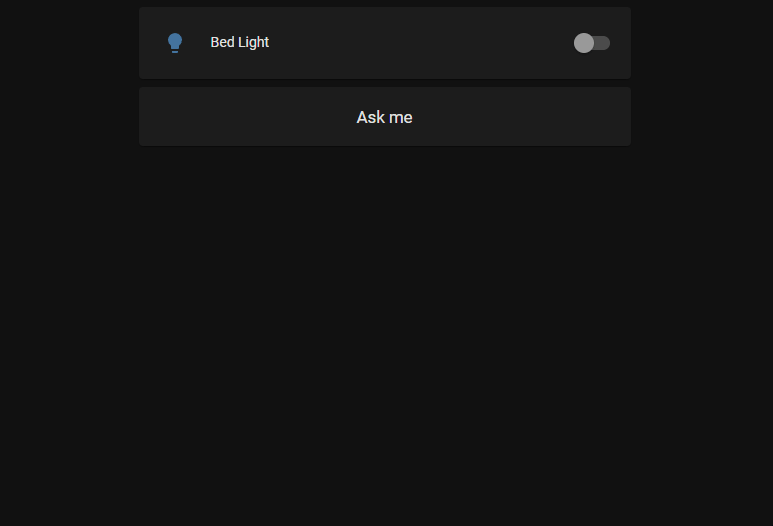15 KiB
browser_mod 2.0
Installation instructions
-
First make sure you have completely removed any installation of Browser Mod 1
-
Either
Find and install Browser Mod underintegrationsin HACS- OR copy the contents of
custom_components/browser_mod/to<your config dir>/custom_components/browser_mod/.
-
Restart Home Assistant
-
Add the "Browser Mod" integration in Settings -> Devices & Services -> Add Integration or click this button:
-
Restart Home Assistant
Browser Mod Panel
When you're logged in as an administrator you should see a new panel called Browser Mod in the sidebar. This is where you controll any Browser Mod settings.
This browser
A basic concept for Browser Mod is the Browser. A Browser is identified by a unique BrowserID stored in the browsers LocalStorage.
Browser Mod will initially assigning a random BrowserID to each Browser that connects, but you can change this if you want.
LocalStorage works basically like cookies in that the information is stored locally on your device. Unlike a cookie, though, the information is bound to a URL. Therefore you may get different BrowserIDs in the same browser if you e.g. access Home Assistant through different URLs inside and outside of your LAN, or through Home Assistant Cloud.
Register
Registering a Browser as a device will create a Home Assistant Device associated with that browser. The device has the following entities:
- A
media_playerentitiy which will play sound through the browser. - A
lightentity will turn the screen on or off and controll the brightness if you are using Fully Kiosk Browser (FKB). If you are not using FKB the function will be simulated by covering the screen with a black (or semitransparent) box. - A motion
binary_sensorwhich reacts to mouse and/or keyboard activity in the Browser. In FKB this can also react to motion in front of the devices camera. - A number of
sensorandbinary_sensorentities providing different bits of information about the Browser which you may or may not find useful.
Registering a browser also enables it to act as a target for Browser Mod services.
BrowserId
This box lets you set the BrowserID for the current Browser.
Note that it is possible to assign the same BrowserID to several browsers, but unpredictable things may happen if several of them are open at the same time.
There may be benefits to using the same BrowserID in some cases, so you'll have to experiment with what works for you.
Enable camera
If your device has a camera, this will allow it to be forwarded as a camera entity to Home Assistant.
Registered Browsers
This section shows all currently registered Browsers and allows you to unregister them. This is useful e.g. if a BrowserID has changed or if you do not have access to a device anymore.
Register CAST browser
If you are using Home Assistant Cast to display a lovelace view on a Chromecast device it will get a BrowserID of "CAST". Since you can't access the Browser Mod config panel from the device, clicking this button will register the CAST browser. Most Browser Mod services will work under Home Assistant Cast.
Frontend Settings
This section is for settings that change the default behavior of the Home Assistant frontend.
Each setting has three levels, Global, Browser and User.
- Changes made on the Global tab will be applied for everyone on every browser.
- Changes made on the Browser tab will be applied for this Browser. The settings here override any Global settings.
- Changes made on the User tab will be applied for the user you're currently logged in as - on any device. The settings here override any Global or Browser settings.
Note that if a setting is set at a lower level but cleared on a higher, it is not undone. It's just not overridden.
Also note that User level settings can only be made when logged in as the user in question, and that the Browser Mod configuration panel is only available to administrators. If you need to change a setting for a non-admin user, you will need to temporarily make them admin for the setup, and then un-admin them.
Favicon template
This allows you to set and dynamically update the favicon of the browser tab/window. I.e. the little icon next to the page title. Favicons can be .png or .ico files and should be placed in your <config>/www directory. The box here should then contain a jinja template which resolves to the path of the icon with <config>/www/ replaced by /local/ (see Hosting files).
Ex:
{% if is_state("light.bed_light", "on") %} /local/icons/green.png {% else %} /local/icons/red.png {% endif %}
Note that this only applies to the current favicon of the page, not any manifest icons such as the loading icon or the icon you get if you save the page to your smartphones homescreen. For those, please see the hass-favicon integration.
Title template
This allows you to set and dynamically update the title text of the browser tab/window by means on a Jinja template.
Ex:
{{ states.persistent_notification | list | count}} - Home Assistant
Hide Sidebar
This will hide the sidebar wit the navigation links. You can still access all the pages via normal links.
Tip: add
/browser-modto the end of your home assistant URL when you need to turn this off again...
Hide header
This will hide the header bar. Completely. It does not care if there are useful navigation links there or not. It's gone.
Tip: See the big yellow warning box at the top of this card? For some reason, it seems to be really easy to forget you turned this on. Please do not bother the Home Assistant team about the header bar missing if you have hidden it yourself. Really, I've forgotten multiple times myself.
Sidebar order
Did you know that you can change the order and hide items from the sidebar? To do so, either go into your profile settings at the bottom left and click "Change the order and hide items from the sidebar", or click and hold on the "Home Assistant" text at the top of the sidebar.
Normally, the order and hidden items only applies to the current device, but this will make it persistent according to the levels described above.
Default dashboard
Like the Sidebar order, the default dashboard (the page shown when you simply access https://<your home assistant url>/ with nothing after the /) can be set in your profile settings but only applies to the current device. This fixes that.
Browser Mod Services
Browser Mod has a number of services you can call to cause things to happen in the target Browser.
Reading guide
Service parameters are described using the following conventions:-
<type>describes the type of a parameter, e.g.<string>is a piece of text<number>is a number<TRUE/false>means the value must be eithertrueorfalsewithtruebeing the default<service call>means a full service call specification. Note that this can be any service, not just Browser Mod services<Browser IDs>is a list of BrowserIDs
-
Square brackets
[ ]indicate that a parameter is optional and can be omitted.
<service call>
A service call is a combination of a service and it's data:
Ex, a <service call> for browser_mod.more_info with light.bed_light as entity:
service: browser_mod.more_info
data:
entity: light.bed_light
Seems obvious, hopefully.
Calling services
Services can be called from the backend using the normal service call procedures. Registered Browsers can be selected as targets through their device:

In yaml, the BrowserID can be used for targeting a specific browser:
service: browser_mod.more_info
data:
entity: light.bed_light
browser_id:
- 79be65e8-f06c78f
If no target or browser_id is specified, the service will target all registerd Browsers.
To call a service from a dashboard use the call-service action or the special action fire-dom-event:
tap_action:
action: fire-dom-event
browser_mod:
service: browser_mod.more_info
data:
entity: light.bed_light
Services called via fire-dom-event or called as a part of a different service call will (by default) only target the current Browser (even if it's not registered).
Finally, in service calls via fire-dom-event or as part of a different service call, the following a parameter browser_id with the value THIS will be replaced with the current Browsers browser ID.
Ex:
tap_action:
action: fire-dom-event
browser_mod:
service: script.print_clicking_browser
data:
browser_id: THIS
with the script:
script:
print_clicking_browser:
sequence:
- service: system_log.write
data:
message: "Button was clicked in {{browser_id}}"
Will print `"Button was clicked in 79be65e8-f06c78f" to the Home Assistant log.
Services
browser_mod.navigate
service: browser_mod.navigate
data:
path: <string>
[browser_id: <Browser IDs>]
This will point the browser to the Home Assistant path given as path.
E.g. /lovelace/, /my-dashboard/bedroom, /browser_mod/, /config/devices/device/20911cc5a63b1caafa2089618545eb8a...
browser_mod.refresh
service: browser_mod.refresh
data:
[browser_id: <Browser IDs>]
This will reload the current page.
browser_mod.more_info
service: browser_mod.more_info
data:
entity: <string>
[large: <true/FALSE>]
[ignore_popup_card: <true/FALSE>]
[browser_id: <Browser IDs>]
This will show the more-info dialog for entity.
If large is true it will be displayed wider (as if you had clicked the name in the dialog).
If ignore_popup_card is true the more-info dialog will be shown even if it is currently overriden by a popup-card.
browser_mod.popup
service: browser_mod.popup
data:
[title: <string>]
content: <string / Dashboard card configuration>
[size: <NORMAL/wide/fullscreen>]
[right_button: <string>]
[right_button_action: <service call>]
[left_button: <string>]
[left_button_action: <service call>]
[dismissable: <TRUE/false>]
[dismiss_action: <service call>]
[autoclose: <true/FALSE>]
[timeout: <number>]
[timeout_action: <service call>]
[style: <string>]
[browser_id: <Browser IDs>]
This will display a popup dialog.
content may be either some text (including HTML) or a dashboard card configuration.
If size is wide or fullscreen the card will be displayed wider or covering the entire window.
right_button and left_button specify the text of two action buttons.
When either action button is clicked, the dialog is closed and the service specified as right_button_action or left_button_action is called.
If dismissable is false, the dialog cannot be closed by the user without clicking either action button. If it is true and the dialog is dismissed, dismiss_action is called.
If autoclose is true the dialog will close automatically when the mouse, screen or keyboard is touched, at which point dismiss_action will be called.
If timeout is specified the dialog will close automatically after timeout milliseconds, at which point timeout_action will be called.
Finally, style lets you specify some CSS styles to apply to the dialog itself (to style a card in the dialog check out card-mod)
Note that any Browser Mod services performed as _actions here will be performed only on the same Browser as initiated the action unless browser_id is given.
Ex:
service: browser_mod.popup
data:
title: The title
content: The content
right_button: Right button
left_button: Left button
service: browser_mod.popup
data:
title: The title
right_button: Right button
left_button: Left button
content:
type: entities
entities:
- light.bed_light
- light.ceiling_lights
- light.kitchen_lights
service: browser_mod.popup
data:
content: Do you want to turn the light on?
right_button: "Yes"
left_button: "No"
right_button_action:
service: light.turn_on
data:
entity_id: light.bed_light
left_button_action:
service: browser_mod.popup
data:
title: Really?
content: Are you sure?
right_button: "Yes"
left_button: "No"
right_button_action:
service: browser_mod.popup
data:
content: Fine, live in darkness.
dismissable: false
title: Ok
timeout: 3000
left_button_action:
service: light.turn_on
data:
entity_id: light.bed_light
browser_mod.close_popup
service: browser_mod.close_popup
data:
[browser_id: <Browser IDs>]
This will close any currently open popup or more-info dialogs.
browser_mod.sequence
service: browser_mod.sequence
data:
sequence:
- <service call>
- <service call>
- ...
[browser_id: <Browser IDs>]
This will perform the listed servie calls one after the other.
Note that if browser_id is omitted in the service calls listed in sequence the services will be performed on the Browser that's targeted as a whole rather than all browsers.
browser_mod.delay
service: browser_mod.delay
data:
time: <number>
[browser_id: <Browser IDs>]
This will wait for time millliseconds. It's probably most useful as part of a browser_mod.sequence call...
browsermod.console
service: browser_mod.console
data:
message: <string>
[browser_id: <Browser IDs>]
This will print message to the console of the target Browser.
browsermod.javascript
service: browser_mod.console
data:
code: <string>
[browser_id: <Browser IDs>]
This will run the arbitrary javascript code in the target Browser.
Only use this one if you know what you're doing.
Popup card
Add a popup card to a lovelace view (via the GUI) and it will override the more-info dialog for the given entity. Try it. More info to come.



